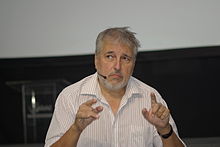
Emir Rodríguez Monegal, born in Uruguay, was a scholar, literary critic, and editor of Latin American literature. From 1969 to 1985, Rodríguez Monegal was professor of Latin American contemporary literature at Yale University. He is usually called by his second surname Emir R. Monegal or Monegal.
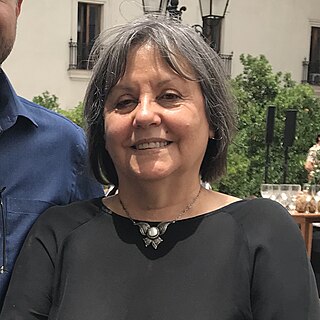
Diamela Eltit is a Chilean writer and university professor. She is a recipient of the National Prize for Literature.

Sigrid Alegría Conrads is a Chilean film and television actress.
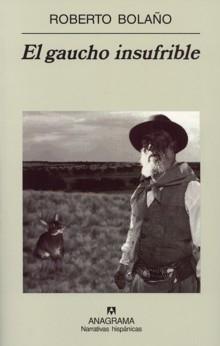
The Insufferable Gaucho is a collection of five short stories and two essays by the Chilean author Roberto Bolaño (1953–2003). It was published in English in 2010, translated by Chris Andrews. During his lifetime, Bolaño made his name as a writer of short stories, and The Insufferable Gaucho collects a disparate variety of work. From its comical title story to the Kafkaesque "Police Rat", the book's wide spectrum of storytelling techniques "makes an ideal introduction to the Bolaño imaginaire." The year after its publication, Bolaño was posthumously awarded in Chile for this work with the Altazor Prize in the "Narrative" category.

Estela Canto was an Argentine writer, journalist, and translator best known for her relationship with Jorge Luis Borges.

Infiltrados is a 2011 Colombian police procedural drama produced by BE-TV and broadcast by Caracol TV.
Teresa Gazitúa is a Chilean artist and writer. Gazitúa was born in Santiago, Chile. In 1967 she earned her title of Professor of Fine Arts and graduated in 1968 with her Bachelor of Arts, majoring in painting, from the Catholic University of Chile. She has worked as Professor of Art at the University of Chile and the Catholic University of Chile.

Enrique "Quique" Neira Leiva is a Chilean reggae singer and composer. He was the lead vocalist of the band Gondwana and is currently a solo artist. He is the most recognized icon of the reggae en español movement in Chile.
Adriana Valdés Budge is a Chilean writer essayist.
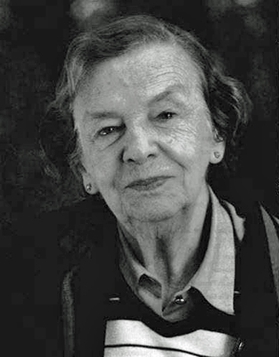
Matilde Pérez Cerda was a Chilean visual artist who specialised in kinetic art. She was a pioneer of modern and kinetic art in Chile. Her best known public pieces include Túnel Cinético in 1970, and el Friso, which was originally constructed at the Centro Comercial Apumanque in 1982, but is now located at the University of Talca.
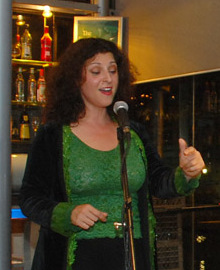
María Francesca Ancarola Saavedra is a Chilean singer and songwriter. Ancarola's musical style is a mix of folk and jazz, with social justice themes, and she is considered a part of the Chilean New Song movement.

Nano Stern is a Chilean singer, multi-instrumentalist and composer of the "third generation of Chilean singer-songwriters" who appear after the 1990s. His work is linked with popular song movements and his style encompasses trova, fusion, folk and rock.
Ximena Zomosa is a visual artist and curator who works in contemporary art and conceptual art, whose work demonstrates — from the perspective of gender — a discourse that is fundamentally feminine. She acted in a managerial and curatorial capacity at the Balmaceda Youth Art Gallery, a space for art by emerging Chilean artists.

Voluspa Jarpa Saldías is a Chilean painter and visual artist of the 1990s who has been involved in painting, installations, and sculpture.
Elisabetta Perut Bozzolo is a Chilean journalist, film director, producer, and screenwriter best known for the documentaries Un hombre aparte and La muerte de Pinochet. Both of these were made in collaboration with Iván Osnovikoff, a director with whom she has done most of her audiovisual work in the documentary field.
Alicia María Villarreal Mesa is a Chilean visual artist, professor, and curator. She specializes in avant-garde conceptual art and experimentalism. She studied the visual arts at the Pontifical Catholic University of Chile and later at the Erg Saint-Luc School Search Graphique in Brussels. Her work shows "a reflective dimension on personal and collective memory and on language and the means of artistic production."
The Caleuche Awards is an awards ceremony presented to recognize the best in performances of the season, in feature films, television serials, miniseries and anthology series, and comedy. They were created and organized by the Corporation of Actors of Chile (Chileactores), sponsored by VTR for their first edition.
El Reemplazante is a Chilean TV series originally broadcast on Televisión Nacional de Chile. The show follows a man, ousted from his previous financial career, who becomes a substitute math teacher at a low income school in Santiago. The plot was partially motivated by the Chilean student protests in 2011. Production was partially funded by the Consejo Nacional de Televisión de Chile. The showrunner was Hernan Rodriguez Matte. At the 2013 Altazor Awards, the show won awards for best direction, best screenplay, and best actor. Nicolas Acuña said that it is possible that a third season happens.

Álvaro Díaz González is a Chilean journalist, producer and director.

Roberto Fortunato Poblete Zapata is a Chilean actor, director, teacher, presenter, announcer and politician. He is known for having participated in several television series on Canal 13 and Chilevisión. He served as a deputy for Los Angeles from 2014 to 2018.
